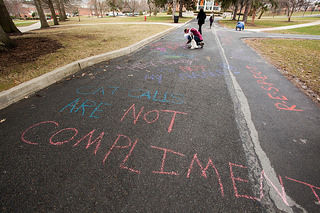There are many people who think that we live in a “feminized” society where women dominate the landscape and are given a strong enough position in society. There are people that even say that women are given too much power in our modern times. To those people, street harassment exists only in the minds of over-entitled women that simply react hysterically and make up conflicts that do not even exist.
However, last year in October when two women were killed within one week as an end result of street harassment, it reminded us of how this kind of pre-violent behavior represents an actual threat in everyday life. One mother from Detroit was shot and killed by a stranger on the street after she refused to give him her phone number. In New York, a second woman ended up having her throat slashed after she was asked out on a date by a stranger, but rejected him.
These are just two examples of what women (and other marginalized groups) fear will happen to them everyday. It is true that most of the time street harassment does not turn into actual violence, but it is also true that many possible victims are tormented by those fears in their daily lives. This specific everyday torment even has a name: the “rape schedule.” It means that scared people adjust their routines to their fears, like taking a different, longer route back home from school to avoid meeting groups of men, or refusing the more lucrative night shifts when working as a waitress because the walk home at night is supposedly not safe.
As a result of this situation, women always hear the same things: “Don’t dress like that,” “Don’t take that way home,” and “Don’t let anyone talk to you.” Furthermore, many public campaigns aimed at women are advising them on how to avoid the dangers that wait for them out in the world and help them to stay safe. Basically, all of these “instructions” are telling women, “Don’t get raped.”
But there are barely any conversations addressed to men that teach them not to rape in the first place. Men that are presented in the media and these campaigns as being the inevitable perpetrators that cannot not rape, because they all are the bad guys. Rather, men should be seen as the ones that support and help women to take actions against those dangerous individuals who have been tolerated in society for too long.
However, many men are often afraid to be judged by other men if they show support, or by women, because they think all men want to harm them.
That is why raising awareness in both men and women is crucial to achieve change. It must be clear that everyone should be a part in preventing street harassment and is able to do something.
Both men and women can help make other people understand that street harassment is only one of the first steps taken that can lead to actual violence. People getting harassed on the street is not simply a small incident that can (or should) be ignored by others. If we allow such seemingly small things to happen, they can turn into much bigger and far more dangerous things.
A reason why individuals ignore those situations and let them slide is that people are often not completely sure what street harassment really is and when it is actually happening. The difficulty is that street harassment means something different to everyone. But in general, harassment is something that the victim does not want and finds uncomfortably intrusive. This is why even whistling and catcalling are harassing behaviours that make the person targeted extremely uncomfortable. The people doing it, however, often interpret their own actions as “compliments” and expect a grateful response in return. If they don’t get the desired feedback, it is the target who is stuck-up and arrogant. Yet these perpetrators would never catcall their mothers, whistle at their sisters, or make inappropriate comments about female friends’ bodies.
And this is where the overall problem lies: it has become okay to not see other people as humans anymore, but only as objects that don’t deserve the respect of a person. If we can change that whole attitude, and re-introduce compassion and understanding for other people into our society, no one would ever have to worry about going home at night.





















































